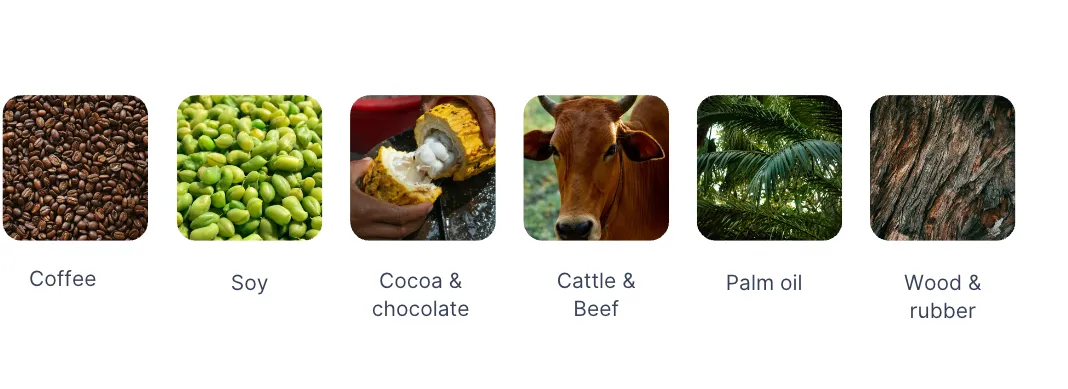The European Union Deforestation Regulation (EUDR) is a landmark piece of legislation designed to combat global deforestation and forest degradation. It places significant responsibility on companies sourcing certain commodities, requiring them to ensure their supply chain is deforestation-free. This blog post provides a comprehensive overview of EUDR, addressing the key questions: Why is it necessary? When does it apply? Who is affected? What Products are Covered by EUDR? And, crucially, how can businesses achieve EUDR compliance?
Why is EUDR compliance necessary?
The EUDR responds to the urgent need to protect the world’s forests. Deforestation contributes significantly to climate change, biodiversity loss, and social issues. Consequently, the regulation aims to curb the EU’s contribution to these problems by holding companies accountable for their supply chains. Building deforestation-free supply chains is not just a regulatory obligation; it’s a crucial step towards a sustainable future.
When does EUDR come into effect?
The EUDR entered into force on June 29th, 2023, with a cut-off date of December 31st, 2020, meaning products covered by the regulation must not be sourced from land that has been deforested or degraded after this date. However, it applies from December 30th, 2025, one year delayed. Small and Medium Enterprises (SMEs) have an additional six months to comply (mid-2026).
Who is affected by EUDR?
The EUDR applies to any operator or trader that places or makes available on the Union market, or exports from the Union market, relevant products (as listed in Annex 1 in the regulation) that contain, have been fed with or have been made using one or more of the seven commodities cattle, cocoa, coffee, oil palm, rubber, soya and wood.

What products are covered by EUDR?
The EUDR covers both raw materials (commodities) and finished products made from these commodities. Here’s a breakdown by commodity, illustrating the scope (the list is not exhaustive):
- Cattle: Beef, leather, and other cattle-derived products.
- Cocoa: Cocoa beans, chocolate, and other cocoa-based goods.
- Coffee: Green coffee beans, roasted coffee, and coffee-based products.
- Oil Palm: Palm oil and its derivatives, such as those used in food, cosmetics, and biofuels.
- Rubber: Natural rubber and rubber-based products like tires and footwear.
- Soya: Soybeans, soybean meal, and soy-derived products used in food and animal feed.
- Wood: Timber, paper, furniture, and other wood-based materials.
Essentially, if your business deals with any stage of the supply chain for these commodities or their derived products—from raw material sourcing to finished product sales—you are likely affected. For a comprehensive list of covered products, refer to the official EUDR guidelines.
How to comply with EUDR: due diligence obligations
Complying with the EUDR requires a robust due diligence system. This can be broken down into the following three key steps (note that the EU is working on a benchmarking list to categorize countries into low, standard and high risk – 2 and 3 below are simplified for low risk countries):
1. Information requirements
A key part of EUDR compliance is establishing robust traceability systems to fulfill the information requirements. Businesses must be able to trace their commodities back to the plot of land where they were produced. This requires detailed information about the origin, production methods, and supply chain actors involved. Tracing batches of different raw materials that are transformed into different end products can be a complex task. Meeting EUDR traceability requirements is essential for demonstrating deforestation-free supply chains.
2. Risk assessment
A core component of EUDR compliance is conducting a thorough EUDR risk assessment. This involves identifying and evaluating the risk of deforestation associated with your supply chain. A robust EUDR risk assessment helps businesses understand their vulnerabilities and develop mitigation strategies.
3. Risk mitigation
Building EU deforestation-free supply chains requires implementing effective risk mitigation measures. This could involve working with certified suppliers, implementing traceability systems, and engaging in sustainable sourcing practices.
EUDR compliance checklist
Complying with the EUDR can be challenging, but a structured approach can simplify the process. Here’s a starting EUDR compliance checklist:
- Map your EUDR supply chain and identify key actors.
- Implement a robust traceability system.
- Conduct a comprehensive EUDR risk assessment.
- Develop a due diligence system to mitigate deforestation risks.
- Engage with suppliers and ensure their compliance.
- Monitor your supply chain for deforestation risks.
- Maintain accurate records and documentation.
Kezzler’s Traceability Platform: Your One-Stop-Shop for traceability requirements
Kezzler’s traceability platform can help businesses adhere to EUDR and other regulations requiring product, batch or item level traceability. Whether it’s the EUDR, other EU Green Deal regulations, the FDA’s FSMA 204, or future traceability mandates, our platform provides a robust solution to support compliance with global traceability standards.
Leveraging GS1 Standards for EUDR compliance
Moreover, the GS1 standards offer a globally recognized framework for product identification and traceability, which can be instrumental in supporting EUDR compliance. In particular, the Electronic Product Code Information Services (EPCIS) standard allows businesses to capture and share key data events across the supply chain, providing the transparency needed for EUDR compliance.
Final thoughts
EUDR compliance is crucial for businesses involved in the trade of commodities and products that contribute to deforestation. By understanding the requirements and implementing the necessary measures, businesses can ensure they comply with the regulation, contribute to the fight against deforestation, and promote sustainable supply chains.
You might also find this interesting
- Our latest solution brief “The power of GS1’s EPCIS 2.0 standard”
- Our white paper “Digital Product Passport: From Concept to Compliance”
- Our work in Cirpass-2
- Learn more about R-strategies in the circular economy
